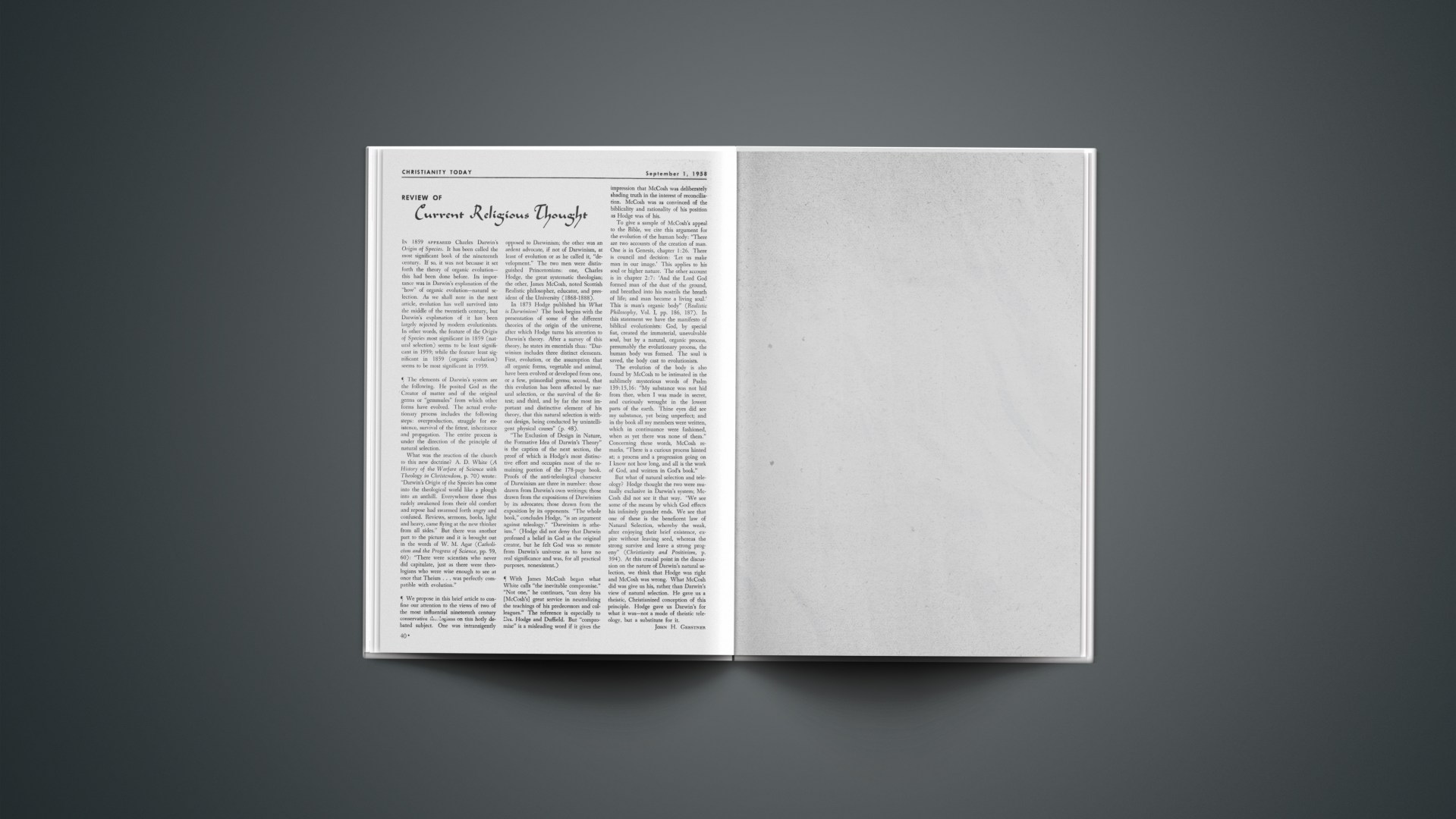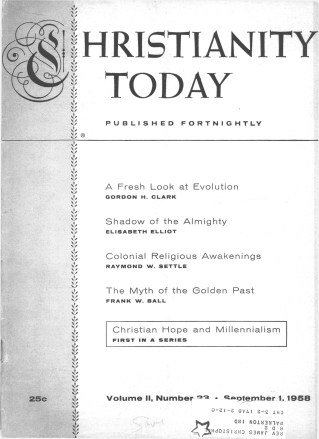In 1859 appeared Charles Darwin’s Origin of Species. It has been called the most significant book of the nineteenth century. If so, it was not because it set forth the theory of organic evolution—this had been done before. Its importance was in Darwin’s explanation of the “how” of organic evolution—natural selection. As we shall note in the next article, evolution has well survived into the middle of the twentieth century, but Darwin’s explanation of it has been largely rejected by modern evolutionists. In other words, the feature of the Origin of Species most significant in 1859 (natural selection) seems to be least significant in 1959; while the feature least significant in 1859 (organic evolution) seems to be most significant in 1959.
The elements of Darwin’s system are the following. He posited God as the Creator of matter and of the original germs or “gemmules” from which other forms have evolved. The actual evolutionary process includes the following steps: overproduction, struggle for existence, survival of the fittest, inheritance and propagation. The entire process is under the direction of the principle of natural selection.
What was the reaction of the church to this new doctrine? A. D. White (A History of the Warfare of Science with Theology in Christendom, p. 70) wrote: “Darwin’s Origin of the Species has come into the theological world like a plough into an anthill. Everywhere those thus rudely awakened from their old comfort and repose had swarmed forth angry and confused. Reviews, sermons, books, light and heavy, came flying at the new thinker from all sides.” But there was another part to the picture and it is brought out in the words of W. M. Agar (Catholicism and the Progress of Science, pp. 59, 60): “There were scientists who never did capitulate, just as there were theologians who were wise enough to see at once that Theism … was perfectly compatible with evolution.”
We propose in this brief article to confine our attention to the views of two of the most influential nineteenth century conservative theologians on this hotly debated subject. One was intransigently opposed to Darwinism; the other was an ardent advocate, if not of Darwinism, at least of evolution or as he called it, “development.” The two men were distinguished Princetonians: one, Charles Hodge, the great systematic theologian; the other, James McCosh, noted Scottish Realistic philosopher, educator, and president of the University (1868–1888).
In 1873 Hodge published his What is Darwinism? The book begins with the presentation of some of the different theories of the origin of the universe, after which Hodge turns his attention to Darwin’s theory. After a survey of this theory, he states its essentials thus: “Darwinism includes three distinct elements. First, evolution, or the assumption that all organic forms, vegetable and animal, have been evolved or developed from one, or a few, primordial germs; second, that this evolution has been affected by natural selection, or the survival of the fittest; and third, and by far the most important and distinctive element of his theory, that this natural selection is without design, being conducted by unintelligent physical causes” (p. 48).
“The Exclusion of Design in Nature, the Formative Idea of Darwin’s Theory” is the caption of the next section, the proof of which is Hodge’s most distinctive effort and occupies most of the remaining portion of the 178-page book. Proofs of the anti-teleological character of Darwinism are three in number: those drawn from Darwin’s own writings; those drawn from the expositions of Darwinism by its advocates; those drawn from the exposition by its opponents. “The whole book,” concludes Hodge, “is an argument against teleology.” “Darwinism is atheism.” (Hodge did not deny that Darwin professed a belief in God as the original creator, but he felt God was so remote from Darwin’s universe as to have no real significance and was, for all practical purposes, nonexistent.)
With James McCosh began what White calls “the inevitable compromise.” “Not one,” he continues, “can deny his [McCosh’s] great service in neutralizing the teachings of his predecessors and colleagues.” The reference is especially to Drs. Hodge and Duffield. But “compromise” is a misleading word if it gives the impression that McCosh was deliberately shading truth in the interest of reconciliation. McCosh was as convinced of the biblicality and rationality of his position as Hodge was of his.
To give a sample of McCosh’s appeal to the Bible, we cite this argument for the evolution of the human body: “There are two accounts of the creation of man. One is in Genesis, chapter 1:26. There is council and decision: ‘Let us make man in our image.’ This applies to his soul or higher nature. The other account is in chapter 2:7: ‘And the Lord God formed man of the dust of the ground, and breathed into his nostrils the breath of life; and man became a living soul.’ This is man’s organic body” (Realistic Philosophy, Vol. I, pp. 186, 187). In this statement we have the manifesto of biblical evolutionists: God, by special fiat, created the immaterial, unevolvable soul, but by a natural, organic process, presumably the evolutionary process, the human body was formed. The soul is saved, the body cast to evolutionists.
The evolution of the body is also found by McCosh to be intimated in the sublimely mysterious words of Psalm 139:15, 16: “My substance was not hid from thee, when I was made in secret, and curiously wrought in the lowest parts of the earth. Thine eyes did see my substance, yet being unperfect; and in thy book all my members were written, which in continuance were fashioned, when as yet there was none of them.” Concerning these words, McCosh remarks, “There is a curious process hinted at; a process and a progression going on I know not how long, and all is the work of God, and written in God’s book.”
But what of natural selection and teleology? Hodge thought the two were mutually exclusive in Darwin’s system; McCosh did not see it that way. “We see some of the means by which God effects his infinitely grander ends. We see that one of these is the beneficent law of Natural Selection, whereby the weak, after enjoying their brief existence, expire without leaving seed, whereas the strong survive and leave a strong progeny” (Christianity and Positivism, p. 394). At this crucial point in the discussion on the nature of Darwin’s natural selection, we think that Hodge was right and McCosh was wrong. What McCosh did was give us his, rather than Darwin’s view of natural selection. He gave us a theistic, Christianized conception of this principle. Hodge gave us Darwin’s for what it was—not a mode of theistic teleology, but a substitute for it.










